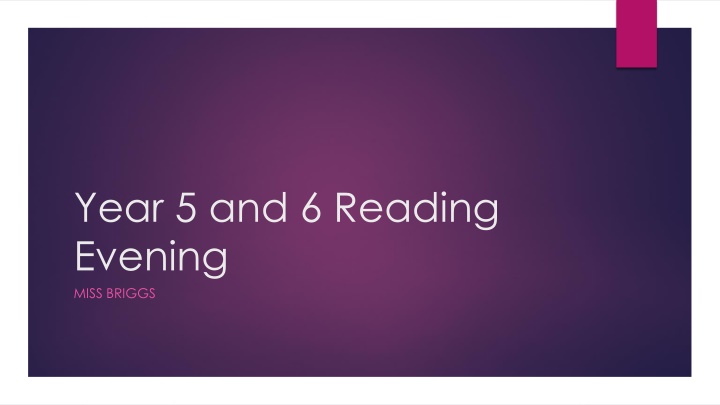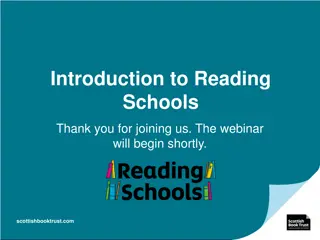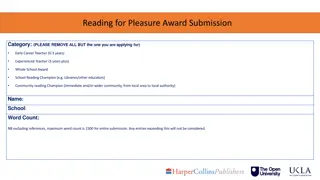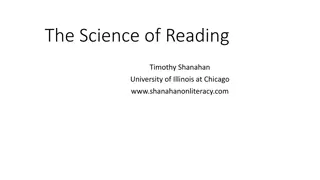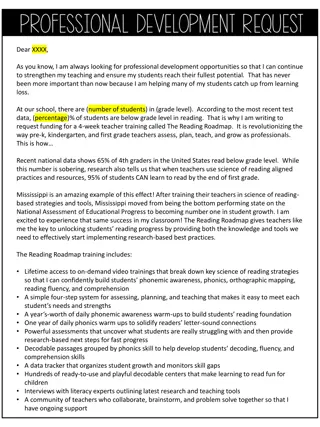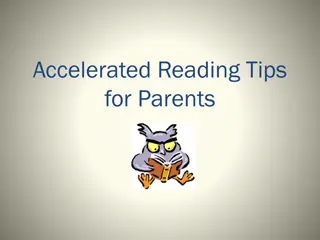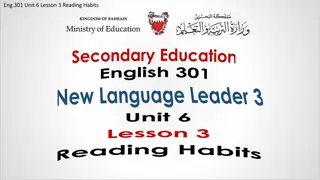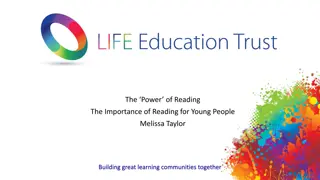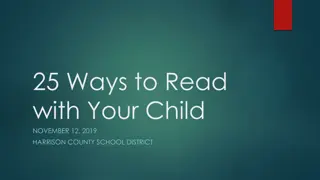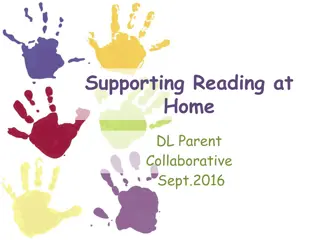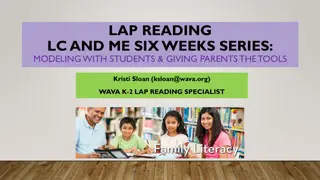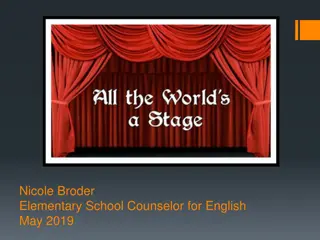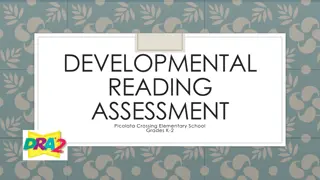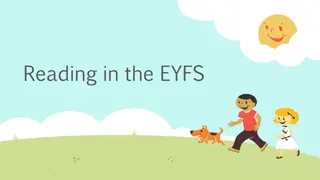Teaching Reading in Year 5/6
A bespoke approach to reading is implemented in Year 5/6 to meet the needs of all children, ensuring successful learning. Structured guided reading sessions focusing on national curriculum skills. Extract analysis depicting character emotions. Importance of reading with children and ways to support reading at home.
Uploaded on Mar 08, 2025 | 0 Views
Download Presentation

Please find below an Image/Link to download the presentation.
The content on the website is provided AS IS for your information and personal use only. It may not be sold, licensed, or shared on other websites without obtaining consent from the author.If you encounter any issues during the download, it is possible that the publisher has removed the file from their server.
You are allowed to download the files provided on this website for personal or commercial use, subject to the condition that they are used lawfully. All files are the property of their respective owners.
The content on the website is provided AS IS for your information and personal use only. It may not be sold, licensed, or shared on other websites without obtaining consent from the author.
E N D
Presentation Transcript
Year 5 and 6 Reading Evening MISS BRIGGS
How we teach reading in Year 5/6 What is our approach to reading? We have a bespoke approach to reading to ensure that all our children s needs are met so they can be the most successful. How do we teach reading? We TEACH reading through WELL PLANNED and STRUCTURED guided reading sessions which are based on the national curriculum. We TEACH reading as a whole class input and then We TEACH our guided reading sessions in a carousel style as this allows us to teach reading skills and then give the children the opportunity to apply them. The rationale behind this is to ensure all children are being taught the skills and can then apply them at their own level so they can all succeed.
Read this extract and then answer the following questions. Remember to use evidence from the characters actions and dialogue to infer how they feel. How do you Jack is feeling? Answer: Jack is frightened. Evidence: trudged reluctantly; dragging his feet; he could feel his heart thumping in his chest and sweat starting to prickle on his palms; fixing his eyes on the teacher's shiny brown shoes; slowly glanced upwards until their eyes met; he gulped. Mr Thompson glared at Jack. His face was stern and his fingers drummed on the desk. Come here, now! he barked. Jack stood up and trudged reluctantly towards the front of the classroom, dragging his feet. He could feel his heart thumping in his chest and sweat starting to prickle on his palms. He stood before Mr Thompson, fixing his eyes on the teacher s shiny brown shoes. Answer: Mr Thompson is angry; he is also an unpleasant man. Evidence: he glared at Jack; his face was stern; he barked and sneered; his words were abrupt and rudely spoken. How do you think Mr Thompson feels? Use evidence from the text. Look at me, boy! sneered Mr Thompson. Jack slowly glanced upwards until their eyes met. He gulped.
Why is it important to read with your child? Never read to 4,662 words Here s how many words children would have heard by the time they were 5 years old: 1-2 times a week 63,570 words 3-5 times a week 169,520 words Daily 296,660 words Five books a day 1,483,300 words
How can you support your child at home with reading. 1. Word Reading Strategies Can they use a range of strategies? Recognising whole words/using their phonics to break words down/using the context of the sentence or clues in the pictures. 2. Reading Aloud Does your child use their voice to make their reading interesting? Can your child use expression? Does your child take into account sentence structure? Does your child respond to punctuation? For example looking for exclamation marks, speech marks, italics etc. to give clues.
How can you support your child at home with reading. 3. Retrieval Can your child find information in the text to answer simple questions about who, where, when, what? 4. Interpretation Can your child put themselves in the character s shoes? Answer questions such as: how do you think they feel? Why do you think/explain/how do we know? What might happen next? Can your child discuss other stories they know with a similar setting or theme? How does this compare to other books by the same author?
How can you support your child at home with reading. 5. Author s choices and impact Can your child discuss the choices made by the author and the impact of these on the reader? For example, answering questions such as: what words did the author use to create excitement or a sad feeling? Have they used similes or alliteration? Discuss adjectives or adverbs used and different types of sentences. How has the author set out or organised the text? 6. Vocabulary within context Can fluently read unfamiliar or subject specific vocabulary within fiction and non-fiction texts? Do they understand the meaning of all the words? In some cases, especially with subject specific vocabulary you will need to tell them the meaning of new words but it is also important for your child to use their knowledge of the text so far, the understanding of the sentence and what is happening to work out the meaning of words
How can you support your child at home with reading. Additional tips: 1. Model a love for books have a book you re reading yourself! Visit the library and find new books together. Get excited about discovering new books. Find every opportunity you can to draw attention to reading in the world around your child. Look at labels in shops, signs when driving or at the park. Make purposeful links with reading. Make time for reading together not just at bedtime or in the car. Carve out time for some valuable reading experiences at least 15-20 minutes a day. 2. 3. 4.
Useful websites Books for topics age appropriate and challenging books https://www.booksfortopics.com/ Fiction express https://en.fictionexpress.com/books/ Chicken House Publishing (free extracts of books and reading activities) https://www.chickenhousebooks.com/schools- hub/
